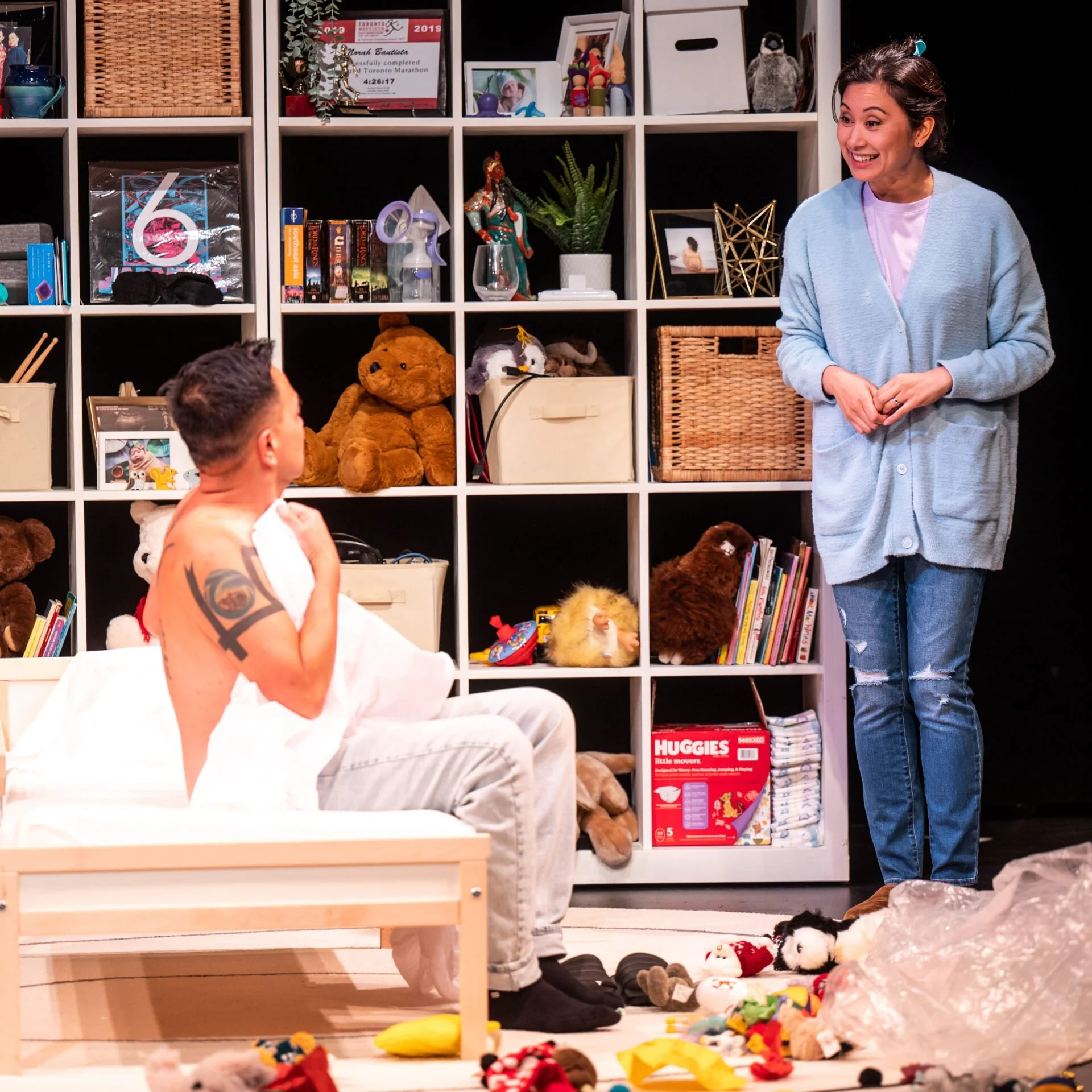Theatre review: With brutal honesty, Bad Parent mines the relationship perils of having kids
Comedic leads Raugi Yu and Josette Jorge bring biting story to hilarious life, often arguing their side directly to the audience
Photo by Dahlia Katz
The Cultch presents Bad Parent at the Historic Theatre until October 23, in a coproduction by Vancouver Asian Canadian Theatre, Prairie Theatre Exchange, and Soulpepper Theatre Company
BAD PARENT PLAYWRIGHT Ins Choi clearly knows firsthand that listening to a wailing baby in the middle of the night—wondering whether to respond or let him “cry it out”—is like staring into the abyss. Or that assembling an IKEA toddler bed can lead to an equally existential crisis.
The brutally honest recipe for Bad Parent starts with the small cruelties and blunt insights that only an intimate partner can hold against you. To that, Choi adds sleepless nights, overflowing laundry hampers, and endless diapers. Now mix all that with the judgment of others—the peanut gallery who have deemed themselves parenting experts (especially the ones who aren’t parents, of course). It all results in a comedy that’s surprisingly biting and decidedly different from the playwright’s hit Kim’s Convenience. That Choi openly admits in the program notes he’s drawn from his own experiences of new parenthood only adds to the bracing honesty of a play that explodes every Huggies-ad cliche of having a baby.
With no one else around to point fingers at, the couple blames each other for their “18-monther” crying all night, invading their bed, falling at the playground, drinking a Coke Zero, and peeing on the car seat.
If all of this sounds daunting, it’s not—thanks in large part to actors Josette Jorge and Raugi Yu, who have an easy chemistry as the beleaguered couple, as well as considerable comedic chops. Choi also makes bold and effective use of the pair breaking the fourth wall: often, they grab a microphone to address the audience directly—trying to argue their side to that aforementioned “peanut gallery”. “Put up your hand if you think I was wrong,” says Jorge at one point. How often, trapped inside a squabble, have you wished to plead your case to an objective party? Or defend your parenting to an onlooker?
Photo by Dahlia Katz
Her Norah and his Charles are hopelessly, humanly flawed. They can’t even agree on the circumstances around the way they met: grabbing the mike, he insists he was playing a gig and she says it was her friend’s wedding. In Yu’s hands, Charles is a man-child whose dreams of music stardom have been squandered; Norah, meanwhile, is in a rush to get back to work, “where everyone is an adult”.
She berates her spouse for not “upping his game”; he chastises her for coddling the child too much. The toddler cot he assembles becomes a symbol of all the frustration: he didn’t ask Norah’s permission to buy it but is desperate to put an end to bringing their kid into bed to stop his crying. That Charles ends up sleeping in the toddler bed only worsens the situation, Yu making uproarious use of an undersized sheet.
In another device that shouldn’t work, but does beautifully in Jorge and Yu’s hands, they each play other characters who enter their spouse’s lives: Jorge steps easily into the role of a Filipinx nanny, while Yu is the suave Dale at Jorge’s work. One of the most incisively written scenes in the play is a discussion between Norah and Dale: they flirt openly with each other, but are adult enough to recognize that their workplace attraction is directly related to the chaos and exhaustion each faces at home.
Yu’s physical comedy is hilarious throughout: watch him bang his finger building the cot, unleashing an extended silent scream so he doesn’t wake the baby; or his ecstatic first taste of his nanny’s traditional Philippines breakfast. Jorge’s comedic style nicely contrasts his, all second takes and knowing glances to the audience.
This show is full of big laughs, of pathos for the little deaths of identities as we shift into adulthood, of cringing recognition of our resentful, bickering selves when we’re at our worst. Director Meg Roe makes all the darker and lighter elements flow smoothly together, and set designer Sophie Tang has crafted a stacked-shelf structure that alludes to the compartmentalization of identities, the ready-made quality of IKEA-furnished ideals, and the mess—emotional and otherwise—that lingers just behind the facade of parenthood.
Still, this endorsement comes with a caveat—especially to those seeing this show who haven’t had kids. It is occasionally so bitter that it could conceivably scare you off, well, conceiving. So on that front, what Bad Parent doesn’t quite get across is that it is all entirely worth it—the shitty diapers, the 2 am wakeup calls, the vicious bickering, and the mindnumbing mountain of laundry.
However, what it absolutely does get right is that the only way through the existential horror is to laugh about it—and to realize that, despite all the judgment out there, no one has a damn clue what they’re doing.















